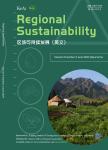Motivations,enablers and barriers to the adoption of climate-smart agricultural practices by smallholder farmers:Evidence from the transitional and savannah agroecological zones of Ghana
Motivations, enablers and barriers to the adoption of climate-smart agricultural practices by smallholder farmers:Evidence from the transitional and savannah agroecological zones of Ghana作者机构:Department of Environmental ScienceKwame Nkrumah University of Science and TechnologyKumasiGhana Sustainability Research InstituteSchool of Earth and EnvironmentUniversity of LeedsLS29JT LeedsUnited Kingdom
出 版 物:《Regional Sustainability》 (区域可持续发展(英文))
年 卷 期:2021年第2卷第4期
页 面:375-386页
学科分类:12[管理学] 0202[经济学-应用经济学] 02[经济学] 0830[工学-环境科学与工程(可授工学、理学、农学学位)] 1203[管理学-农林经济管理] 020205[经济学-产业经济学] 0807[工学-动力工程及工程热物理] 09[农学] 0903[农学-农业资源与环境]
基 金:the Future Leaders-African Independent Research(FLAIR)Fellowships funded by the Royal Society London(FLR\R1\201640)
主 题:Climate-smart agriculture Smallholder farmers Food security Climate change Weighted average index Problem confrontation index Ghana
摘 要:This paper examined the prioritized climate-smart agricultural practices by smallholder farmers,the motivations of adopting climate-smart agricultural practices,the enablers to the successful adoption of climate-smart agricultural practices,and the barriers to the successful adoption of climate-smart agricultural practices in the transitional and savannah agroecological zones of ***,we employed ethnographic research using participatory approaches,including two stakeholder workshops and household surveys with 1061 households in the transitional and savannah agroecological zones of *** weighted average index(WAI)and problem confrontation index(PCI)were used to rank smallholder farmers’perceived enablers to the adoption of climate-smart agricultural practices and the barriers affecting climate-smart agricultural practices,*** suggest that the majority of the respondents used a suite of climate-smart agricultural practices,including the timely harvesting of produce and storage,emergency seed banking,appropriate and timely weed and pest control,and early planting as practices to build climate *** majority of smallholder farmers primarily employed climate-smart agricultural practices to improve household food security(96.2%),reduce pests and diseases(95.6%),and obtain higher yields and greater farm income(93.2%).Findings also show that secured land tenure system arrangement,understanding the effects of climate change,and access to sustainable agricultural technologies were ranked the first,second,and third most important enablers to the adoption of climate-smart agricultural practices with the WAI values of 2.86,2.75,and 2.70,*** barriers to the successful adoption of climate-smart agricultural practices included incidences of pests and diseases(PCI=2530),inadequate access to agricultural credit(PCI=2502),high cost of improved crop varieties(PCI=2334),and limited government support with farm inputs(PCI=2296).Sm



